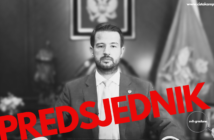For many years the Montenegrin political scene was tainted with the allegations of the misuse of state resources to election purposes, undue pressure of the governing structures on the free choice of voters, inaccurate voter registers, and law violations on the very election day. Nonetheless, the institutional practice in handling possible irregularities was very limited, given that political parties rarely filed complaints or instigated any procedures with the competent authorities.
In April 2013, session transcripts from the highest bodies of the governing party were published revealing many mechanisms of undue influence of the governing structures on the voters’ choice through misappropriation of state resources.
Following the publication of the Tape Recording affair, in June 2013, under the pressure from the public and the European Union, a parliamentary working group was set up, composed of the representatives of all political parties and the nongovernmental sector, tasked with drafting amendments to election legislation. In February 2014, the Parliament adopted the amendments to the Political Party Funding Law and the Law on Election of Local Councillors and MPs, as well as the new Voter Register Law.
The application of the new Voter Register Law was postponed for 01 November 2014, together with some of the amended provisions of the Law on Election of Local Councillors and MPs concerning the new voter identification system. On the other hand, all the amended provisions of the Political Party Funding Law were in effect for the local elections in 12 municipalities held on 25 May. Immediately after the elections, most of the amended provisions were declared unconstitutional by the Constitutional Court ruling passed upon the initiative launched by the governing party; hence, a new working group was set to redraft the said law.
Aiming to increase public trust in the election process, build capacities of relevant bodies and develop institutional practices, MANS observed the implementation of all three election related laws on the occasion of the 2014 local elections, based on the experience gained through observation of a part of the process for parliamentary and presidential elections held in 2012 and 2013, respectively.
We collected official information from state authorities on budgetary appropriations pending the elections invoking the Free Access to Information Law, as well as the information received from citizens and insiders, we analysed spending patterns of different institutions and investigated into specific cases of possible irregularities that we reported to competent state authorities. We have also analysed several versions of voter registers used for the elections over the last five years; volunteers checked possible irregularities in the field, based on which we made reports to competent state authorities.
We observed the process on the election day in Podgorica, as a pilot project, following the methodology developed based on the EU standards and with the assistance of several foreign experts. Over 550 MANS observers monitored the election practices at 199 polling stations designated for casting votes by over 90% of the electorate. Mobile voting and voting procedures in places of detention were observed for the first time. In cooperation with the Association of Young People with Disabilities, we observed the polling station accessibility for persons with disabilities to be able to exercise their rights. Finally, based on allegations of numerous irregularities noted by our observers, we lodged complaints with competent authorities, and our legal team monitored the actions taken as per the complaints.
The present publication is divided in three parts focusing on the implementation of election legislation. Part One deals with specific cases of misuse of state resources into election purposes. Part Two deals with the voter register irregularities and actions taken by relevant institutions in specific cases. Part Three addresses the irregularities at polling stations observed on the election day, actions taken bay competent authorities upon complaints, and the information on pressures and attacks against observers.
Complete publication you may download HERE (PDF)



